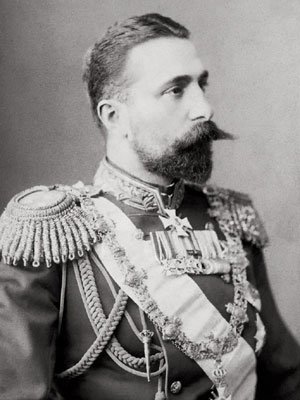
© Photo: www.lostbulgaria.com
On 5 April 2012 we marked the 155th birth anniversary of Prince Alexander of Battenberg, the first Bulgarian head of state after Bulgaria’s liberation from Ottoman rule. On 17 April is the 133rd anniversary since his election to the Bulgarian throne. On that day the Grand National Assembly unanimously voted in support of the young German prince. A few months later, on 26 June 1879, he was sworn in in the Bulgarian medieval capital Veliko Tarnovo and took over as sovereign.
Marieta Staneva from the National Museum of Military History says more about Prince Alexander Battenberg. “Over the recent years a few new studies about his rule have been released highlighting his indisputable contribution into the emergence of the Bulgarian army as a intrinsically national institution. Exhibitions have been organized including displays in Germany and at Austria’s State Archives in Vienna to popularize his life and work, and his inputs as one of the leaders of the young Bulgarian state. Alexander Joseph von Battenberg was born on 5 April 1857 in Verona. He was trained in a cadet school in Dresden. His family came from the grand dukes of Hessen. His father Alexander von Hessen was the fourth child of the Grand Duke of Hessen, and the elder sister of his father married the Russian emperor. In fact Russian Tsar Alexander II was his uncle and godfather.
There are however certain little known facts from the life of Battenberg regarding his involvement in the 1877-1878 Russo-Turkish War of Liberation. In the war Alexander Battenberg was a volunteer aged just 20, first lieutenant in the 8th Voznesenski Ulan Regiment. He took part in the very first operation of the war – the passage of the Danube as well as in the battles near Kazanluk, Stara Zagora and Pleven. For the landing at Svishtov he was given the St. Vladimir Order with Swords, and for the battle at Kazanluk, the St. Great Martyr George, 4th Class. Seeing him off for the war, his aunt, the Russian Empress Maria Alexandrovna gave him a golden cross as a talisman, 12 silk shirts and 1000 gold rubles, plus three horses, a tent and a camp-bed.
During the war Alexander Battenberg kept a detailed diary and he hardly missed a single day. From its pages we can learn a few interesting facts about the war and about the hardships that the young lieutenant endured in cold blood. Alexander wrote that the town of Kazanluk was attacked on 17 July 1877 at 5 pm; that consequently the reinforced Turkish camp near the village of Shipka was seized and that hungry Alexander took some ship’s bread from the luggage of a dead Turkish soldier. The diary recounts one of the most dramatic moments in the war’s operations, the seizure of Pleven.
“10 December, Monday”, the young lieutenant wrote. ”The emperor, on horseback, rode in the direction of the Green Hill and watched the town of Pleven and how our troops approached it and went on to take it. The news came that behind Pleven almost the whole Turkish army supply train with women and children had been captured. At 12:30 pm the gunfire suddenly died down… At 3 pm a colonel drunk with joy came over with the news that Osman Pasha, the commander of the Turkish troops at Pleven, had surrendered with his whole army. The emperor took down his cap and cried out Hurrah! All of us greeted him, he broke down in tears of great joy and awarded Russian Defense Minister Milyutin with the St. Great Martyr George Cross, 2nd class. We went back with the carts and whoever saw us met us with Hurrah. Everybody was happy and my Bulgarians cried out Hurrah too.”
Personal effects of Alexander Battenberg have survived too, attesting to his participation in the Russo-Turkish War of Liberation. These are kept at the National Museum of Military History where they were presented as a donation by his wife Countess von Hartenau in 1937. These belongings include a great coat, a monocle, a card case and the hoof of his favorite horse Dyushek that he rode all the way from Svishtov on the Danube to San Stefano in Turkey where the treaty for the war’s end was signed. While fighting in the war, Alexander Battenberg had everywhere with him a beautifully handwritten prayer for protection that his sister Maria-Caroline, the Princess of Erbach-Schoenberg, had given him when he had volunteered in the war in 1877. Until the last moment of his life he kept the prayer by to his bed. It goes like this:
O, my dear God
Be with me in my quiet room,
A guard by my door,
An angel devout and kind
Steps quietly towards me,
And tells me that should I follow the truthful good,
This night and forever
I will be immune to pain.
Written by Marieta Staneva, National Museum of Military History, Sofia
Translated by Daniela Konstantinova
Archaeologists from the Historical Museum in the town of Gorna Oryahovitsa have discovered a settlement of the Cumans this summer during the excavations of a medieval necropolis east of the Thracian fortress of Rykhovets near the town of Gorna..
Not far from the town of Lovech, between the villages of Doirentsi and Drenov, during the construction of the future route of the Hemus motorway, a seven-thousand-year-old pit sanctuary surrounded by a ritual ditch was discovered . Its exploration began..
On one of the hottest days of summer, 20 July, the Christian Orthodox church honours the prophet Elijah. Many churches around the country have been named after the Old Testament prophet. According to the bible, Elijah lived in the 9 th century BC...
Archaeologists from the Historical Museum in the town of Gorna Oryahovitsa have discovered a settlement of the Cumans this summer during the excavations..

+359 2 9336 661
